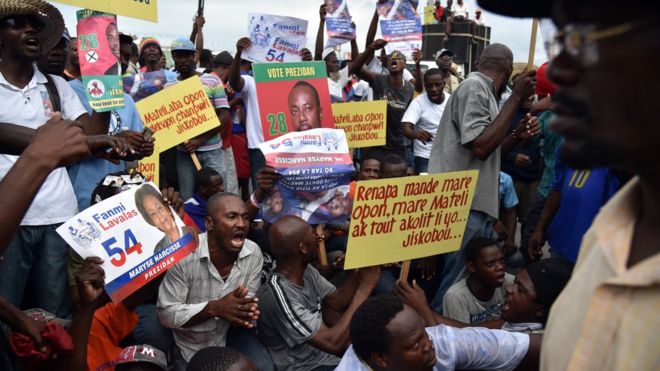By Samuel Miller
Impunity Watch Desk Reporter, North America and Oceania
PORT-AU-PRINCE, Haiti — Haitian authorities postponed the country’s presidential and legislative runoffs because they said they needed to wait for recommendations from a special commission tasked with evaluating the widely criticized electoral process.

There were violent protests last month after the council announced the results of the first round of voting.
Jovenel Moise, a banana exporter, won the most votes but with 33% fell short of a majority. On Sunday, he was to face ex-state construction company head Jude Celestin, who came second with 25%.
The winner will succeed President Michel Martelly next February as the head of the Western Hemisphere’s poorest country.
In parts of Northern and Southern Haiti, angry partisans insisted that the results released late Friday by the much-criticized electoral council did not reflect the will of voters. Presidential and legislative runoffs were scheduled for next weekend amid numerous accusations of fraud and manipulation of results.
On Saturday, street protests erupted when the results were announced; this led to several government buildings being set ablaze, and the death of one demonstrator. In the nearby town of Ferrier, another elections office burned and the mayor’s office was lit on fire. In northwestern Haiti, some houses and schools were set ablaze.
Police Inspector Guytho Noel said an 18-year-old protester was fatally shot when two factions clashed on the streets of the northeastern town of Terrier Rouge.
In recent days, President Michel Martelly announced that a five-member commission would assess Haiti’s electoral process ahead of the runoffs that opposition factions have threatened to derail because of suspicions of widespread fraud. However, the commission and the way in which it was formed has come under heavy criticism.
The opposition and the Senate have rejected the body and the government has also been forced to postpone the swearing-in of its members, who were supposed to have issued a report by Sunday.
While international observers have endorsed results from the first two rounds of this year’s elections, an array of rights groups, local election monitors and political factions allege they were so marred by fraud that their validity is in question.
In recent days, several legislative candidates have taken to the airwaves stating how they were asked to pay thousands of dollars in bribes to electoral court judges and council members in hopes of securing a spot in parliament.
For more information, please see:
BBC News — Haiti presidential election run-off delayed – 21 December 2015
USA Today — Haiti postpones scheduled presidential runoff – 21 December 2015
Jamaica Observer — Violence in Haiti as final election results released – 20 December 2015
ABC News — Election Results Ignite Violent Protests in Haiti – 19 December 2015